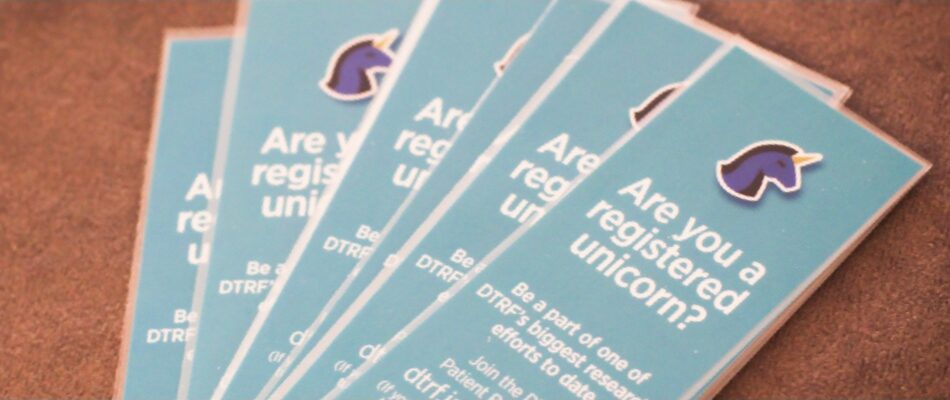Important First Steps After Your New Diagnosis
A new diagnosis can leave you with uncertainty and questions. The steps below will help you understand your diagnosis and guide you through your journey.
Download the new DTRF Patient Brochure to learn more about desmoid tumors. Share the brochure with your physician, caregivers, and loved ones to increase knowledge and awareness of desmoid tumors.
Find a sarcoma specialist.
When diagnosed with a desmoid tumor, it is important to be evaluated and treated by a desmoid tumor expert, often known as a sarcoma specialist. Sarcoma specialists can typically be found at major sarcoma centers within academic medical centers and can help support patient care through a robust multidisciplinary team of doctors knowledgeable in medical oncology, surgical oncology, radiology, interventional radiology, pathology, etc. These major medical centers may have designations as a National Comprehensive Cancer Network (NCCN) or as a Sarcoma Alliance for Research through Collaboration (SARC) Center.
Educate yourself about desmoid tumors to ensure you get the best care.
You are your best advocate. Learning as much as you can about desmoid tumors will help ensure that you are getting the best care and treatment possible.
Please remember that desmoid tumors are very complex and the information below is a general overview and not intended as medical advice for any individual problem, or as a diagnosis, treatment plan, or recommendation for a particular course of action, and should not be used as a substitute for professional medical advice and services. Please do not delay in seeking professional medical advice regarding your individual circumstances.
- You can learn more about desmoid tumors by visiting our Diagnosis and Treatment & Monitoring pages.
- Read the Global Consensus Paper on Desmoid Tumor Treatment. There is a scientific version and a patient version of the paper. The way in which desmoid tumors are managed depends greatly on the individual case and factors like location, size, rate of growth, and symptoms. There is not one standard way to treat desmoid tumors. The Consensus Paper outlines an decision tree of how the treatment process can go. It can be helpful to bring the Consensus Paper to your next doctor’s appointment to discuss the best treatment path for you.
- Read about some of the most frequently asked questions on desmoid tumors and treatment options.
- Watch Patient Meeting presentations from leading experts in desmoid tumors.
- Review and discuss with your doctor the current clinical trials available for desmoid tumor patients.
Stay up-to-date
Stay up-to-date on the latest research findings, clinical trials, and DTRF activities.
Explore helpful resources from DTRF and beyond.
While you’re taking care of your physical health, don’t forget your mental health and your financial health. Our list of resources listed by category cover a broad range of programs, services and initiatives for those in need of support.
Participate in patient-powered research to help advance desmoid tumor science.
DTRF Patient Registry and Natural History Study
The DTRF Patient Registry is a dynamic tool that collects patient data about diagnosis, treatment, disease progression, and quality of life through online surveys. This de-identified data informs our natural history study, which will help us address unknowns about the disease and support the medical community to develop standards of care.
Patients who join are asked to fill out surveys on our registry platform. Our patient registry can be found at DTRF.iamrare.org. If you have any questions, you can email us at registry@dtrf.org. Thank you for your interest in participating!
Get connected to the community.
Connecting with other patients and families who have walked a similar path can help provide a valuable support system as you navigate this disease.
We provide multiple ways in which patients and caregivers can connect and build a supportive community.
DTRF Together We Will Weekend
Our annual DTRF Together We Will Weekend invites our global community of patients, caregivers, clinicians, and researchers to come together for a weekend of events designed to foster learning, connection, and collaboration.
Find out more information about this year’s Weekend.
Social Media
Follow us on Facebook, Twitter, Instagram and LinkedIn. Many patients also join the independent, patient-run Facebook group called the “Desmoidian” to connect with other patients.
International Advocacy Organizations and Support Groups
Desmoid tumors are rare, but the community is strong. Wherever you are, connect with others through online support groups and local patient advocacy organizations.
Save the date!
Our annual DTRF Together We Will Weekend and RFA 5K & Fun Run happen on the weekend of the fourth Sunday of September. These signature events provide education, connection, collaboration and fundraising opportunities for our entire community.
Table of Contents
Virtual Tumor Board
If you are facing challenges in your desmoid tumor treatment, your case may be eligible to be presented by your doctor at our virtual tumor board.
A Letter from Mrinal Gounder, MD

Read Dr. Gounder’s paper, “Locally Aggressive Connective Tissue Tumors” in the Journal of Clinical Oncology.
My name is Dr. Mrinal Gounder, and I am a medical oncologist practicing at Memorial Sloan Kettering Cancer Center in New York City. For more than a decade, I have devoted my efforts to building a clinical practice where I take care of a large number of people diagnosed with desmoid tumors. I am also the Scientific Director of DTRF. As a cancer researcher, I am passionate about finding a cure and discovering new drugs to treat desmoid tumors.
If you are reading this page, it is likely that you, your child or your loved ones may have been diagnosed with a desmoid tumor. It is normal to feel frightened, anxious, frustrated, confused or isolated. This is a very rare condition, but the good news is that you are not alone. We are here to help and support you. We hope that this website provides you with information that will empower you and your doctor to make an informed medical decision together. We hope that the broader patient community of DTRF will be a safe space for you to meet other patients and their families – to connect and exchange your stories and experiences.
The good news is that this is often a treatable (and sometimes even curable) condition. I am happy to share that in the last decade – thanks to the Desmoid Tumor Research Foundation – we have been able to build a community of patients, their caregivers, doctors and researchers. This has helped gather a tremendous amount of knowledge about how best to treat desmoid tumors. Thanks in part to DTRF’s support for cutting-edge research, we are now seeing an exciting number of new drugs and modalities to treat this condition.
We are here to help and support you.
Dr. Mrinal Gounder
Continue Exploring
